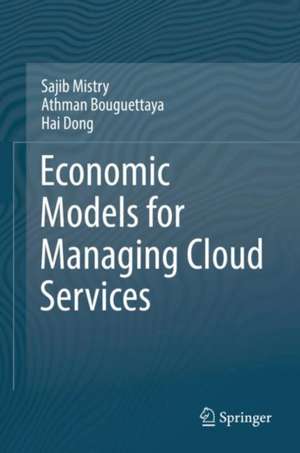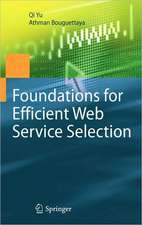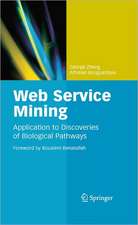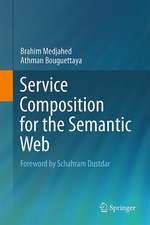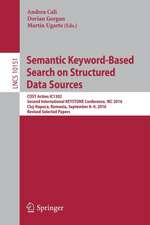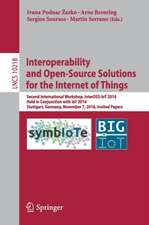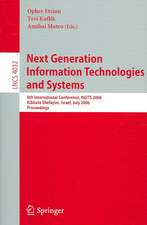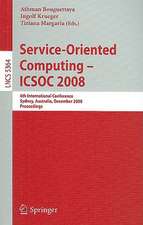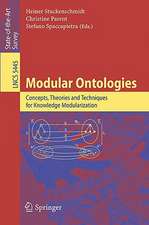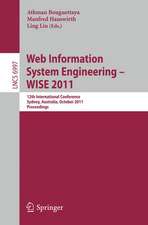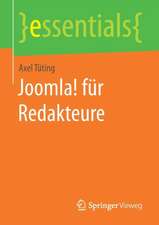Economic Models for Managing Cloud Services
Autor Sajib Mistry, Athman Bouguettaya, Hai Dongen Limba Engleză Hardback – 22 feb 2018
The authors propose a new multivariate Hidden Markov and Autoregressive Integrated Moving Average (HMM-ARIMA) model to predict various patterns of runtime resource utilization. A heuristic-based Integer Linear Programming (ILP) optimization approach is developed to maximize the runtime resource utilization. It deploys a Dynamic Bayesian Network (DBN) to model the dynamic pricing and long-term operating cost. A new Hybrid Adaptive Genetic Algorithm (HAGA) is proposed that optimizes a non-linear profit function periodically to address the stochastic arrival of requests. Next, the authors explore the Temporal Conditional Preference Network (TempCP-Net) as the qualitative economic model to represent the high-level IaaS business strategies. The temporal qualitative preferences are indexed in a multidimensional k-d tree to efficiently compute the preference ranking at runtime. A three-dimensional Q-learning approach is developed to find an optimal qualitative composition using statistical analysis on historical request patterns.
Finally, the authors propose a new multivariate approach to predict future Quality of Service (QoS) performances of peer service providers to efficiently configure a TempCP-Net. It discusses the experimental results and evaluates the efficiency of the proposed composition framework using Google Cluster data, real-world QoS data, and synthetic data. It also explores the significance of the proposed approach in creating an economically viable and stable cloud market.
This book can be utilized as a useful reference to anyone who is interested in theory, practice, and application of economic models in cloud computing. This book will be an invaluable guide for small and medium entrepreneurs who have invested or plan to invest in cloud infrastructures and services. Overall, this book is suitable for a wide audience that includes students, researchers, and practitioners studying or working in service-oriented computing and cloud computing.
| Toate formatele și edițiile | Preț | Express |
|---|---|---|
| Paperback (1) | 299.90 lei 38-45 zile | |
| Springer International Publishing – 9 iun 2019 | 299.90 lei 38-45 zile | |
| Hardback (1) | 332.39 lei 3-5 săpt. | |
| Springer International Publishing – 22 feb 2018 | 332.39 lei 3-5 săpt. |
Preț: 332.39 lei
Preț vechi: 415.49 lei
-20% Nou
Puncte Express: 499
Preț estimativ în valută:
63.60€ • 68.01$ • 53.03£
63.60€ • 68.01$ • 53.03£
Carte disponibilă
Livrare economică 28 martie-11 aprilie
Preluare comenzi: 021 569.72.76
Specificații
ISBN-13: 9783319738758
ISBN-10: 3319738755
Pagini: 152
Ilustrații: XIX, 141 p. 53 illus., 12 illus. in color.
Dimensiuni: 155 x 235 mm
Greutate: 0.42 kg
Ediția:1st ed. 2018
Editura: Springer International Publishing
Colecția Springer
Locul publicării:Cham, Switzerland
ISBN-10: 3319738755
Pagini: 152
Ilustrații: XIX, 141 p. 53 illus., 12 illus. in color.
Dimensiuni: 155 x 235 mm
Greutate: 0.42 kg
Ediția:1st ed. 2018
Editura: Springer International Publishing
Colecția Springer
Locul publicării:Cham, Switzerland
Cuprins
1 Introduction.- 2 Cloud Service Composition: The State of the Art.- 3 Long-term IaaS Composition for Deterministic Requests.- 4 Long-term IaaS Composition for Stochastic Requests.- 5 Long-term Qualitative IaaS Composition.- 6 Service Providers' Long-term QoS Prediction Model.- 7 Conclusion.
Caracteristici
One of the first books that develops a long-term cloud service composition framework from a provider’s perspective The proposed framework provides significant momentum to the business of IaaS providers, especially small providers Explores innovative methodologies for wider adoption of the cloud services at a greater scale and faster pace Discusses the state-of-art technologies and composition framework to enable an economically viable cloud market
